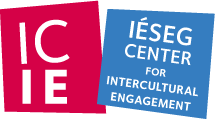
Bjørn Z. Ekelund, Chairman of Human Factors AS, is the creator of the Diversity Icebreaker tool, an application that is used internationally in training to improve communication and interaction between members of a group or members of an organization. We spoke to him about the importance of intercultural skills and how business schools can help students develop these competences.
Why do you feel intercultural skills and engagement are so important in the 21st Century?
During history, the world has been through a number of different periods where globalization has increased. For example, after the Second World War when globalization was driven by trade and politics.
Today, we see the same kind of globalization processes happening, but they are driven not only by trade or politics, but also by technology and the fact that capital can move relatively easily. Looking to the future, climate change is one of key challenges that society faces. Water, air, etc. are elements that do not respect borders. What one country does influences the whole global environment. Therefore, institutions will need to work across borders and develop new ways of working together to solve these types of truly global issues. From my point of my view, therefore, there is a need for individuals who can work together across borders, who can lead and make decisions to help provide truly global solutions to a variety of challenges such as climate change.
How do you feel business schools can ensure graduate schools develop these intercultural skills?
This is a challenge that all schools face. Schools already recruit international students worldwide and some also recruit international staff. This provides different possibilities on campus for creating interaction between people of different cultures and background. The real question is, how do you set up different pedagogical activities to enable people to develop these competences.
Many schools look to send their students abroad (which IÉSEG also does) and this has become more and more common over the last decades. They may also cooperate on curricula or provide joint courses or classes using new technology at a distance. But it’s not just enough bring to people together, they need to be given the tools to learn from their experience.
The way IÉSEG has dealt with intercultural training for students and staff to create internationalization at home is very different from other Schools.
Since 2012, it has gradually developed a specific intercultural development program for its students that I really admire. They have really tried to set up a sound program that helps students cope and deal with diversity – in terms of people’s personality, disciplinary and cultural differences. It’s not just knowing more about country X or Y. Students need to be able to cope and interact with different people in a productive way. They fill in the Diversity Ice breaker questionnaire and take part in the Diversity Icebreaker seminar, they learn about cultural and communication differences, they do interactive teamwork, and at the end they create a personal development plan. The results from this program have shown that students really can learn from this kind of experience on campus, and that this helps prepare them when they go abroad to study or work. (All students on the Grande Ecole program must complete this intercultural training before going on exchange)
Today, IÉSEG has created one of the most complete programs to help develop students that are able to work in cross-disciplinary cross cultural teams. We will need these kind of people in the future.
How unique is it for a School to train staff and students?
I have not seen a School that is tackling intercultural challenges in such a systematic way as IÉSEG. Staff experience in person what the students are learning. This fits with the model that you should teach, learn and practice what you would like your students to practice. It is a major undertaking for a School of this size to train both its students and staff and this requires the commitment of both management and staff. My company works with around 30 or 40 universities that are using our tools in different ways, but IÉSEG is the only school with such an integrated program for students and staff.
In its attempt to foster the development of cultural intelligence (CQ) throughout the school and to make this part of the DNA of all the members of the IESEG community, the school has put in place a number of initiatives:
- A compulsory Cultural Diversity Passport for all the Bachelor’s students
- A compulsory 3-day Dealing Daily With Diversity training for all the staff, academic and administrative
- An optional Cultural Diversity Certificate for the Master’s students
- An optional Cultural Diversity Awareness Badge for the international exchange students.
These initiatives are coordinated by the PCHI (People and Intercultural Skills Pole) headed by Ingrid Richard.

